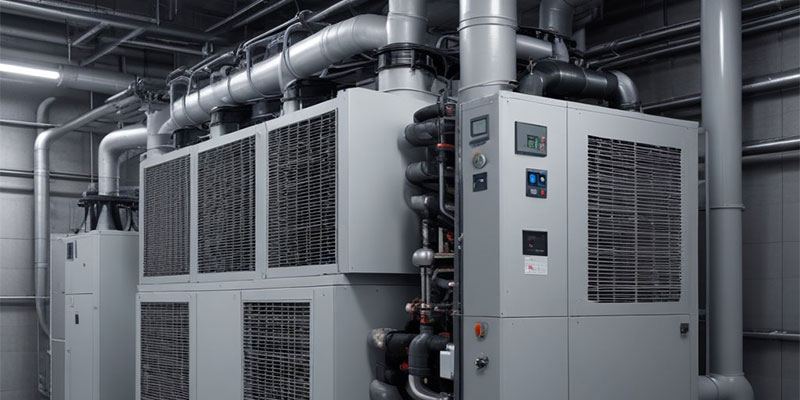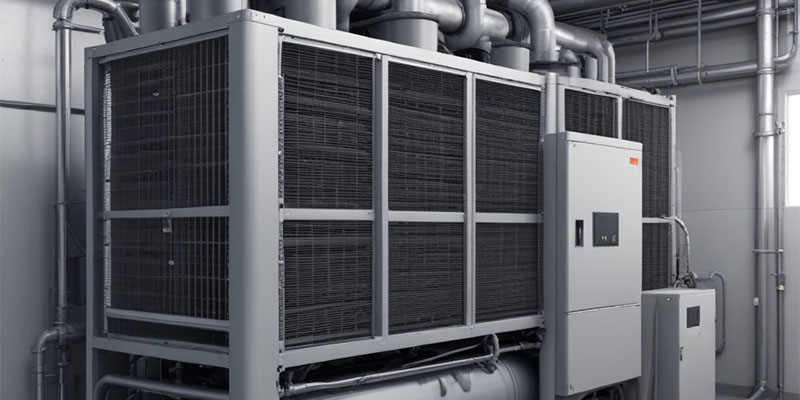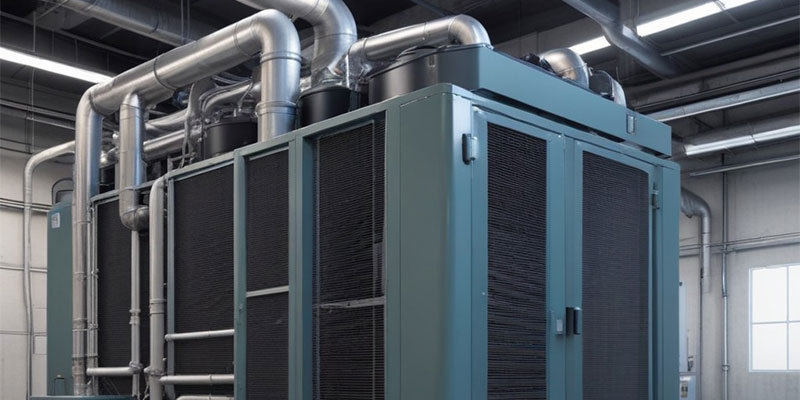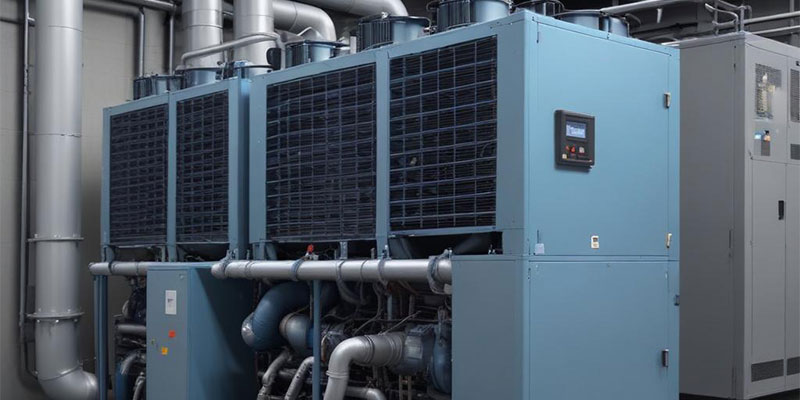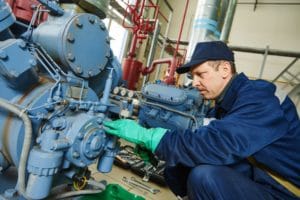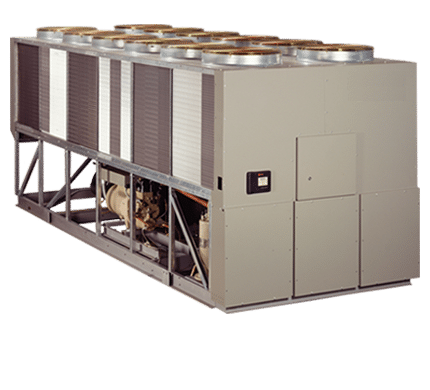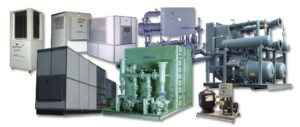Introduction
If your facility uses process fluids or heat-generating machinery, an industrial chiller system is essential for cooling processes and internal machine components. Understanding how industrial chillers work and the various types available will help you choose the right one for your cooling needs.
Industrial Chiller Definition – An Industrial Chiller?
Industrial chillers are refrigeration systems cooling fluids for various purposes. These chilled liquids then cool environments or equipment. Chillers have diverse applications, from food production to plastics creation, all involving units that cool water or air to chill equipment or areas.
Why Use An Industrial Chiller?
Industrial chillers are great for industrial applications and offer a variety of benefits to businesses, including:
- Rapid and efficient cooling of important industrial processes
- Improve production times by keeping machinery in an optimal operation climate
- Maintain a consistent temperature to ensure product quality remains high
- Reduce energy costs by using expelled thermal energy to heat other rooms
At Alliance Comforts System, we can help you to select the ideal industrial chiller for your business, simply get in touch using the form below to discuss your industrial refrigeration needs.
Operating Principles of Industrial Chillers
Industrial chillers can be designed to operate on either the principle of heat absorption or vapor compression. Additionally, they can be either air-cooled or water-cooled. Regardless of the system specifics, a reliable commercial compressor is essential for proper operation.
Today, there are three categories of industrial chillers commonly in use:
1. Vapor Compression Chillers
Vapor compression chillers circulate coolant through industrial processes, absorbing heat. The coolant is then cooled in a refrigerant system and recirculated. Most modern electric chillers use this reliable and efficient method, ideal for many industrial settings.
2. Heat Absorption Chillers
Heat absorption chillers use onboard heat exchangers to dissipate process heat through a network of coolant pipes, which can contain air, water, or water mixed with other fluids. However, they lack the reliability and performance control of vapor compression chillers.
3. Water-cooled and Air-Cooled Chillers
Water-cooled chillers require an external cooling tower, while air-cooled chillers use ambient air to reduce refrigerant temperatures. Fans blow air over refrigerant-filled tubes to dissipate the heat effectively.
Read More Blogs: Louisville Chiller Repair Best Options for HVAC Units
What Are Chillers Used For?
Chillers are essential in various industries for removing heat from liquids, ensuring optimal equipment performance, and maintaining environmental conditions.
Industrial process chillers are utilized in diverse applications such as:
Cover Area Cooling: Manufacturing equipment generates significant heat, creating a potentially hazardous environment for employees. Cover area cooling units cool factory air, making it safer and more comfortable. These systems also keep offices cool during warm weather. Rental package units can provide temporary cooling without the expense of purchasing a full-sized HVAC system.
Process Cooling: Industrial processes generate heat through friction, equipment, or combustion. Process chillers cool a circulating liquid to maintain set temperatures for large applications, like schools. These chillers use water, propylene glycol, ethylene glycol, methanol, or ethanol to keep equipment at safe operating temperatures or facilitate cooling processes in diverse industries such as petrochemical manufacturing and plastics production.
Plastic Manufacturing: Plastic is temperature-sensitive and can melt if overheated. During production, plastics must cool in molds to an appropriate temperature, requiring efficient chillers. Extruded plastics also need a cooling bath, which chillers provide. An ideal setup includes a second heat exchanger to separate equipment cooling water from extrusion water, preventing contamination.
Metal Plating and Anodizing: Metal plating, through electroplating or electroless plating, and anodizing require high temperatures. These processes need heavy-duty chillers to remove heat from the solutions. Some facilities use heat exchangers for cooling, while others use glycol or water-containing coils to cool the fluids in the tanks, ensuring proper temperature management.
Food Processing: The food production industry relies heavily on industrial chillers. Glycol coolers circulate chilled propylene glycol through cooling coils to maintain food or beverage storage units at optimal temperatures. Breweries, wineries, and food manufacturers use these chillers for cooling products, chilling dough mixers, and ice cream makers.
Types of Industrial Chillers
Types of chillers used in industries such as petrochemicals and food production include air-cooled and water-cooled. These types of chillers differ in how the refrigerant gives off the heat it absorbs. Each class has its advantages and disadvantages, depending on its use:
- Water-Cooled Chillers: Water-cooled chillers use water from an external cooling tower to dissipate heat from the refrigerant in the condenser, facilitating its phase change from gas to liquid.
- Air-Cooled Chillers: Air-cooled chillers rely on ambient air to reject heat from the refrigerant in the condenser, eliminating the need for cooling water.
- Screw Industrial Chillers: Screw chillers, available in both water-cooled and air-cooled versions, use one or two screws to compress the refrigerant. Capacities range from 30 to over 400 tons, suitable for various Industrial HVAC applications.
- Scroll Chillers: Scroll chillers employ interlocking scrolls to pressurize the refrigerant. They can be air-cooled or water-cooled, with capacities from 2 to 140 tons, making them ideal for smaller-scale applications like cooling individual equipment.
- Centrifugal Industrial Chillers: Centrifugal chillers use rotating impellers to compress and transport the refrigerant. They are ideal for medium to large-scale operations, with capacities ranging from 150 to 6000 tons.
- Absorption Chillers: Absorption chillers use steam or hot water to change the refrigerant into vapor, which is then condensed and absorbed into a solution, releasing heat. These chillers are suitable for applications where waste heat or steam is available.
- Reciprocating Industrial Chillers: Reciprocating chillers use pistons and a chamber to compress the refrigerant. They require regular maintenance and are available in sealed or open configurations.
- Explosion-Proof Industrial Chillers: Designed to meet NFPA guidelines, explosion-proof chillers have reinforced structures to protect against flammable materials, ensuring worker safety in hazardous environments.
- Glycol chillers: Glycol chillers use propylene glycol as an antifreeze, making them ideal for food-grade applications like alcohol production and brewery chilling systems.
- Vapor Compressor Chillers: These chillers use refrigerants to cool process fluids and spaces, with a compressor driving the refrigerant through the system.
- Vapor Absorption Chillers: Vapor absorption chillers lack a compressor, instead using a heat source like solar energy or waste heat to circulate the coolant.
How Do Industrial Chillers Work?
An industrial chiller operates on the principle of vapor-compression or vapor absorption, utilizing changes in the state or pressure of the refrigerant within the compressor, evaporator, and condenser to cool equipment or an environment. This general overview serves as an introduction, but we will explore in detail the critical functions each component performs in transferring heat away from the process and returning chilled liquid to it.
Basic Chiller Components
- Condenser: The condenser is responsible for expelling the heat absorbed from the process or space being cooled, typically transferring it to the surrounding environment through air or water.
- Compressor: The compressor serves as the heart of the chiller, increasing the pressure of the refrigerant and facilitating its circulation through the system.
- Evaporators: Evaporators play a crucial role in absorbing heat from the fluid being chilled, causing the refrigerant to evaporate and effectively cooling the fluid.
- Thermal Expansion Valves: Thermal expansion valves regulate the flow of refrigerant into the evaporator, ensuring the correct amount of refrigerant is metered for efficient heat exchange.
- Power Unit: The power unit supplies the necessary electrical energy to operate the chiller’s components, including the compressor, fans, and control systems.
- Control Panels: Control panels house the electronic controls and interfaces that allow operators to monitor and adjust the chiller’s operation, ensuring optimal performance and efficiency.
- Water Boxes: Water boxes are used in water-cooled chillers to facilitate the entry and exit of water to and from the condenser, playing a key role in the heat exchange process.
Maintenance Tips for Industrial Chillers
Regular Inspections: Check for leaks, unusual noises, and vibrations.
Cleaning: Keep evaporators and condensers clean to ensure efficient heat exchange.
Lubrication: Ensure compressors and other moving parts are well-lubricated.
Filter Changes: Replace or clean filters regularly to maintain air and water quality.
System Calibration: Regularly check and calibrate control systems for optimal performance.
Fluid Levels: Monitor and maintain proper refrigerant and water levels.
How Much Does a Chiller Cost?
The cost of an industrial chiller can vary widely depending on its capacity, type, and features. Small, portable chillers might start at around $5,000, while large, custom-built units can exceed $100,000. Installation, maintenance, and operational costs should also be considered.
How Long Do Industrial Chillers Last?
With proper maintenance, industrial chillers typically last between 15 to 20 years. Factors influencing their lifespan include the quality of the chiller, the operating environment, and how well the maintenance is performed.
Determining the Right Size of Chiller for Your Needs
To determine the appropriate size of a chiller, consider:
Cooling Load: Calculate the amount of heat to be removed, usually measured in BTU/hr or kW.
Process Requirements: Understand the temperature requirements of your process.
Flow Rate: Determine the flow rate needed for the process fluid.
Safety Margins: Include a safety margin to handle unexpected loads or future expansion.
Getting The Most Out of Your Chiller
Optimal Placement: Ensure the chiller is installed in a location with good ventilation.
Regular Maintenance: Follow a rigorous maintenance schedule.
Energy Efficiency: Use energy-efficient settings and technologies.
Monitoring Systems: Implement monitoring systems to track performance and detect issues early.
Trust Alliance Comfort Sys for All Your Chiller Needs!
Alliance Comfort System offers a comprehensive range of industrial chillers designed to meet diverse needs. With expertise in installation, maintenance, and repair, we ensure your chiller operates at peak efficiency. Our team is dedicated to providing reliable, cost-effective solutions tailored to your specific requirements. Trust us to keep your processes cool and efficient.
Address
7200 Distribution Dr, Louisville, KY 40258Phone: (502) 384-8500 Email: ACS.receptionist@AllianceComfortSys.com
Opening Hours
| Monday | 9:00 a.m. – 5:00 p.m. |
| Tuesday | 9:00 a.m. – 5:00 p.m. |
| Wednesday | 9:00 a.m. – 5:00 p.m. |
| Thursday | 9:00 a.m. – 5:00 p.m. |
| Friday | 9:00 a.m. – 5:00 p.m. |
| Saturday | Closed |
| Sunday | Closed |

